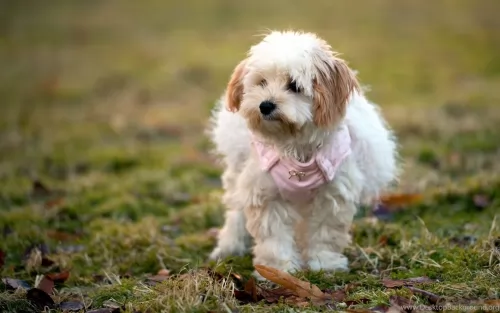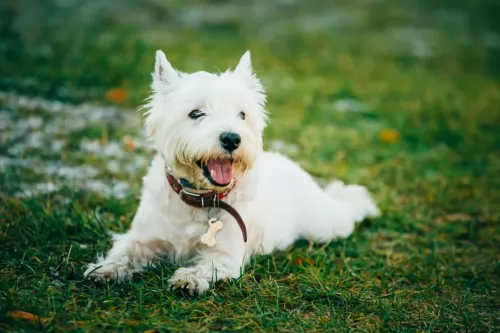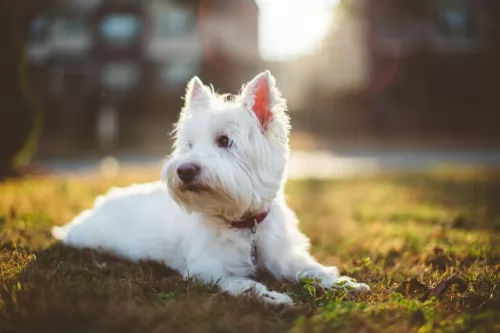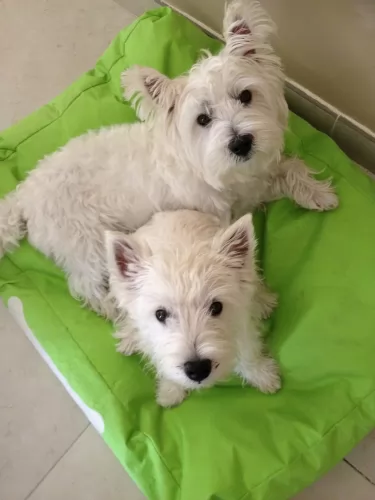 Petzlover
Petzlover West Highland White Terrier is originated from United Kingdom but Bolognese is originated from Italy. Both West Highland White Terrier and Bolognese are of same height. West Highland White Terrier may weigh 6 kg / 14 pounds more than Bolognese. Both West Highland White Terrier and Bolognese has almost same life span. Both West Highland White Terrier and Bolognese has same litter size. West Highland White Terrier requires High Maintenance. But Bolognese requires Moderate Maintenance
West Highland White Terrier is originated from United Kingdom but Bolognese is originated from Italy. Both West Highland White Terrier and Bolognese are of same height. West Highland White Terrier may weigh 6 kg / 14 pounds more than Bolognese. Both West Highland White Terrier and Bolognese has almost same life span. Both West Highland White Terrier and Bolognese has same litter size. West Highland White Terrier requires High Maintenance. But Bolognese requires Moderate Maintenance
 The West highland white terrier originated from Poltalloch in Scotland. So they were initially called as Poltalloch terrier and after that they were called as Roseneath terrier. They were initially used for hunting fox, badger, otter and in killing the vermin like rats.
The West highland white terrier originated from Poltalloch in Scotland. So they were initially called as Poltalloch terrier and after that they were called as Roseneath terrier. They were initially used for hunting fox, badger, otter and in killing the vermin like rats.
The breed history says that Colonel Malcolm of Poltalloch was the reason for the Westie's white colour. This is because in 19th centuryhe went for hunting with his dogs and accidentally he shot his dog as its colour was as fox. So he decided to breed only white colour dogs.
 The Bolognese has already been on record since the 13th century, being particularly popular among the aristocracy during the Renaissance. The breed hails from Italy. He belongs to a family of dogs that include the Maltese and Bichon Frise, all with similar temperaments and looks. Even though there are these similarities the Bolognese is a breed on its own – a distinctive breed.
The Bolognese has already been on record since the 13th century, being particularly popular among the aristocracy during the Renaissance. The breed hails from Italy. He belongs to a family of dogs that include the Maltese and Bichon Frise, all with similar temperaments and looks. Even though there are these similarities the Bolognese is a breed on its own – a distinctive breed.
The exact ancestry of the Bolognese isn’t altogether clear. The dog breed was brought to England in 1990 by Liz Stannard and it was in 2001 that the breed was shown at dog shows. He is classified as a toy companion breed.
 The Westie can be said as that a small dog having the talents of the big dog. They are very popular for their obedience. They are also working as therapy dogs and also some in search and rescue teams. The home having Westie will have fun always and be enthusiastic. They will suit them for country or city living, but they like to live with their family. They are well suitable for apartment living, but some training should be given to them for not barking. They can stay in home when you are at work. Westie can be taken to travel, whether it may be long vacation or a short visit.
The Westie can be said as that a small dog having the talents of the big dog. They are very popular for their obedience. They are also working as therapy dogs and also some in search and rescue teams. The home having Westie will have fun always and be enthusiastic. They will suit them for country or city living, but they like to live with their family. They are well suitable for apartment living, but some training should be given to them for not barking. They can stay in home when you are at work. Westie can be taken to travel, whether it may be long vacation or a short visit.
They are quick learners and so training them is not difficult. Mistakes of them can be corrected patiently since they don't like harsh activities against them. Westie will definitely bark when he sees something or hear different sounds. He will bark on seeing visitors or even other dogs. Sometimes they will bark for very silly things but when given appropriate training in their young stage, they can bark only for alerts.
 The long, flocked white coat doesn’t have an undercoat and the large, round, dark eyes peer out of a cloud of white hair. His hair sheds very little and some owners of the Bolognese like to keep the woolly hair texture trimmed. He has black nails and a largish black nose. He is a small dog, with the male standing between 27–30cm and the female being slightly smaller.
The long, flocked white coat doesn’t have an undercoat and the large, round, dark eyes peer out of a cloud of white hair. His hair sheds very little and some owners of the Bolognese like to keep the woolly hair texture trimmed. He has black nails and a largish black nose. He is a small dog, with the male standing between 27–30cm and the female being slightly smaller.
These little dogs weigh in at about 4kg. A toy breed, he is considered to be a true companion dog. He is compact and squarely built with his floppy ears set high on his head. The long tail is carried curved over the dog’s back.
He is a friendly, social dog and can very easily become a typical lap-dog because he just craves human companionship. He wants to be with you and close to your side, whether you live in the city or in the countryside – he adapts to life wherever you are.
 The Westie is friendly with children but not all the time. So some care should be taken while they are near children.
The Westie is friendly with children but not all the time. So some care should be taken while they are near children.
They like to chase rodents like rabbits as they are interested in hunting.
They are suitable for apartment living unless they are left alone for a very long time. They love cold weather more than hot.
They can be trained by giving some extra efforts.
 The Bolognese is an easy-going, playful, intelligent little dog who will respond well to training and socialization. He can actually become calm and docile dog, although never dull as he can sometimes act like a clown and be quite entertaining. He makes a wonderful pet and becomes a loyal and devoted companion to adults and children.
The Bolognese is an easy-going, playful, intelligent little dog who will respond well to training and socialization. He can actually become calm and docile dog, although never dull as he can sometimes act like a clown and be quite entertaining. He makes a wonderful pet and becomes a loyal and devoted companion to adults and children.
Non-aggressive by nature, he will be friends with other pets in the home too. He is a small dog, so he isn’t going to be highly active and therefore won’t need loads of exercise, although he will love to go for a walk with you. He’ll also want to have games with the ball. He is such an amicable little dog and will easily adapt to life in the city or country, so long as he can be loved and cherished by his owners.
 Because this particular dog breed is uncommon, you won’t find many details on his health problems. When he is well looked after, he can reach 14 years of age. The Bolognese is from the Bichon Frise family so you can expect similar health problems, and also because he is a pedigree dog.
Because this particular dog breed is uncommon, you won’t find many details on his health problems. When he is well looked after, he can reach 14 years of age. The Bolognese is from the Bichon Frise family so you can expect similar health problems, and also because he is a pedigree dog.
Skin problems – battling with itchy skin conditions are a typical problem with the Bolognese.
Ear infections are common because of a lot of hair in the ear which can collect dirt.
Eye diseases - cataracts which can eventually lead to blindness.
Other health problems to watch for are heart disease, and epilepsy. Periodontitis is something you want to keep an eye on too because the small jaw is prone to developing periodontal infection which can lead to tooth loss.
Remember if you don’t want your Bolognese to be a parent, neutering and spaying provides major health benefits for your dogs.
 The puppy should be fed 3 to 4 times per day as it requires a considerable amount for their growth. Cooked chicken breast and turkey are best for them and also vegetables should be given to them. Beef and chicken should be kept a limit as it will lead to itchy skin and allergies.
The puppy should be fed 3 to 4 times per day as it requires a considerable amount for their growth. Cooked chicken breast and turkey are best for them and also vegetables should be given to them. Beef and chicken should be kept a limit as it will lead to itchy skin and allergies.
The preferable food for the Westie is home cooked. The home food will only contain all the essential nutrients for the Westie.
Eventhough the Westie is suitable for apartment living it is recommended to have a daily walk for him to be active and refreshing.
They should be made to play for atleast 30 minutes per day for their health as to not gain overweight. Grown up children can play with them as they like it.
 The little Bolognese isn’t a big shedder so he isn’t a high maintenance pet. His long cloud of white hair can’t just be left though, because it will become tangled and dirty. Get the right grooming tools because his hair will require a good brushing every 2nd day or so. Professional grooming will also be required to keep his coat in tip-top condition.
The little Bolognese isn’t a big shedder so he isn’t a high maintenance pet. His long cloud of white hair can’t just be left though, because it will become tangled and dirty. Get the right grooming tools because his hair will require a good brushing every 2nd day or so. Professional grooming will also be required to keep his coat in tip-top condition.
You may want to use commercially manufactured dog food from leading brands recommended by your vet for small breed dogs. There is absolutely nothing wrong with that, but just like you want some variety in your diet, so does your pet.
Rice, meat and vegetables can be added into his food now and then as well as ensuring he has some raw meat in his diet. This is important if you want to ensure the health of your dog. Never leave your pet without a constant supply of fresh, cool water.
You can actually buy pet ear cleaners but you have to very careful not to go too deep into your pet’s ears as this can cause damage.
Brush your dog’s teeth a couple of times a week. Never use human toothpaste. You can buy special dog’s toothpaste and toothbrush.